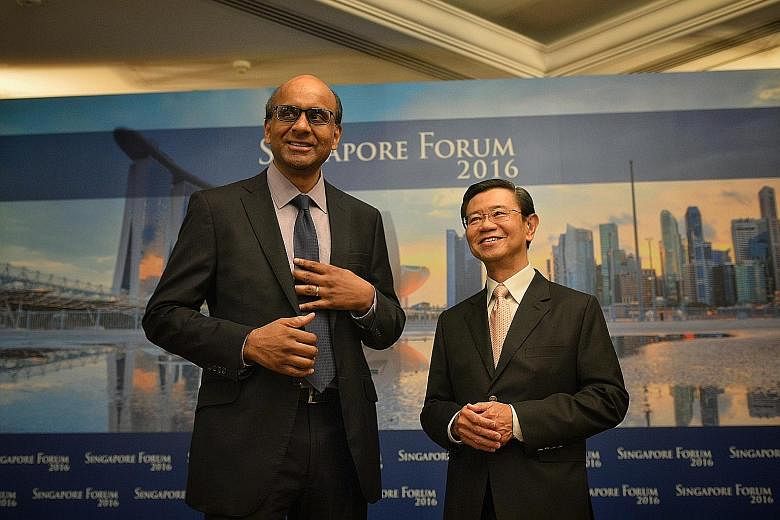The slowdown in productivity growth is faced by countries around the world, including Singapore. And this situation has given rise to a simmering anxiety among middle-income families, Deputy Prime Minister Tharman Shanmugaratnam said last night.
The reason is the slowdown has caused wages to stagnate, he added.
In the United States, some of the most prominent politicians have leveraged this sentiment to gain popular support in the race to be their party's candidate in the November presidential election, he said, referencing businessman Donald Trump of the Republican Party.
Mr Tharman identified this development as one of the four issues that have led to a sense of fragility in regional and global affairs, as seen in the job losses among middle-income earners and the increasing polarisation in advanced democracies.
The other issues are: an obsession with monetary policy which has "very little to do with big issues of the day", China's transformation as it moves up the economic value chain, and sectarian strife.

But these challenges also present tremendous opportunities for a "major rejuvenation" in the most advanced economies as well as Asia, he said.
Mr Tharman, who is the Coordinating Minister for Economic and Social Policies, was speaking at the opening dinner of an annual forum that will discuss issues facing Asia's development.
The two-day Singapore Forum, organised by the S. Rajaratnam Endowment, was attended by about 250 business leaders, politicians and thought leaders.
Elaborating on the productivity situation in Singapore, he said domestic sectors have been a drag on productivity growth.
From 2011 to last year, the average productivity growth yearly in outward-oriented sectors, such as manufacturing and finance, was 3.2 per cent. But in the domestic sectors such as construction and retail, it was 0.2 per cent.
The figures are gloomier for 2013 to 2015: 3.2 per cent versus minus 0.6 per cent.
"It's a real divergence and what we have is an economy of two halves," Mr Tharman said. "But whether you see it as a glass half-full or a glass half-empty, we have to fill it up full. And we can.
"We have to provide platforms that every firm small and large can hop onto, and that help spread innovations in each industry."
This is the prime role of the new Industry Transformation Programme which was unveiled in the Budget statement last Thursday .
It is estimated to cost $4.5 billion over five years and is largely aimed at helping small and medium-sized enterprises scale up.
Mr Tharman noted that baby- boomers in the West have received "very substantial promises".
But the challenge lies in "how Western societies are going to sustain this system of promises, impose the cost on a younger generation of workers, and retain faith in democracy at the same time".
He pointed out that in Singapore, the elderly have their homes as assets and the Government does not have unfunded liabilities. As such, it has been able to help through policies such as the Pioneer Generation Package for those aged 65 and older, and the Silver Support Scheme for the elderly poor.
In his speech, Mr Tharman also said there was a need to move away from an "obsession" with monetary policy, which has "very little to do with big issues of the day" such as preserving middle-class jobs in the face of advances in technology, or sustaining pensions and healthcare funding.
"This idea that the solutions lie in monetary policy is quite wrong, and a real distraction from the true task of governments - to form a consensus on what the priorities are, what to invest in, and to move on in tackling the structural issues," he said.
He also noted that sectarian strife has caused a new wave of migrants to be more disaffected than before.
The first generation of migrants had accommodated themselves to their new environment, while society had also accommodated them well, he said.
But the gap has become more pronounced in the last four decades - even in the US with its achievements in the civil rights movement, he added. And this has been evident in jobs and the rate of incarceration, among other things.
"We need a new social compact in multicultural societies, one that is inclusive and not exclusive. We need labour markets to be open so that the young and migrants are not excluded," he said, noting this has been integral to the Singapore approach since independence as it had no choice.
"It is ingrained in our thinking. There is continuous work and continuous adjustments, but it's been ingrained in our thinking from the start," he said.
He noted that there are no easy solutions as they deal with "a legacy of segregation".
"To tackle these legacies, we need fresh approaches, and we need a certain frankness in politics to recognise the underlying problems."
Correction: An earlier version of this article mistakenly stated that Mr Tharman said that the elderly do not have unfunded liabilities. He had actually said that the Government does not have said liabilities, and as such it has been able to help the elderly through various policies. We are sorry for the error.


